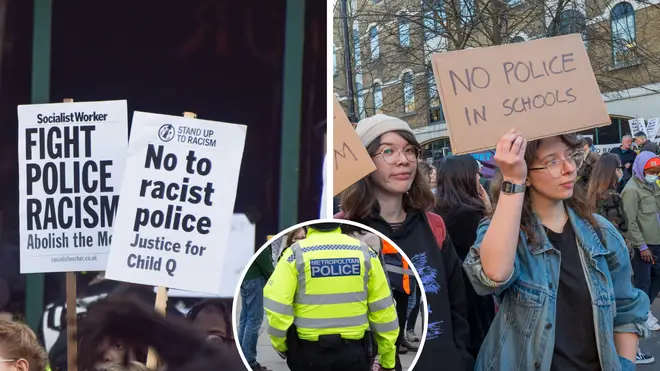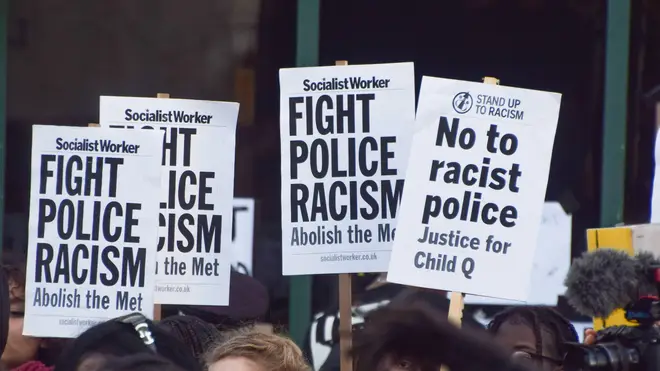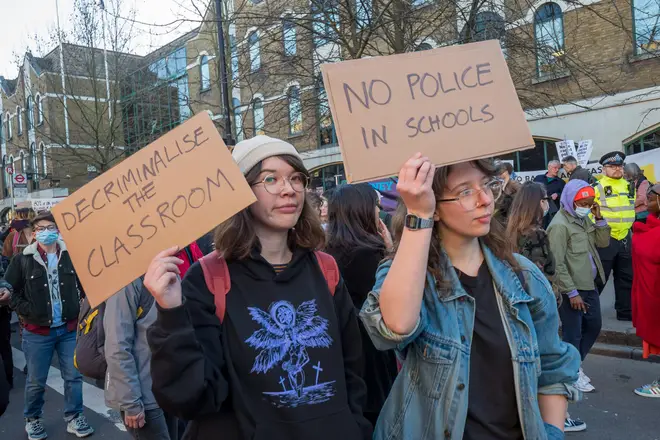
Shelagh Fogarty 1pm - 4pm
24 June 2022, 12:52 | Updated: 24 June 2022, 12:59

The police watchdog is investigating seven more instances of the Metropolitan Police strip searching children.
The force confirmed it had made a further seven "voluntary referrals" to the Independent Office for Police Conduct (IOPC).
The Met confirmed to LBC that the instances referred to strip searches on seven different children.
Read more: Revealed: Most children strip-searched by Met come from ethnic backgrounds
Read more: Police watchdog probes strip-search of a third child by the Met
The force said the incidents all took place between December 2019 and March 2022.
The children, aged between 14 and 17, were strip searched in custody or subject to "more intimate searches" outside custody, the Met said.

LBC exclusive report on the Met's strip searches on children
It comes after the Met was investigated by the IOPC over three instances of strip searches carried out on children.
The children were known as Child Q, Child A, and Olivia.
The case of Child Q, a 15-year-old black girl, sparked conversation about the appropriateness and proportionality of police strip searches, as well as reigniting debate about sexism and racism within the police.
Read more: Four Met Police officers investigated after black schoolgirl strip-searched
Read more: Met officers 'cut underwear off menstruating autistic mixed-race teen during strip search'
Child Q was strip-searched by officers in 2020 after she was wrongly suspected of taking cannabis into her east London school.
She was searched without an adult present, with officers fully aware she was on her period.
The IOPC confirmed earlier in June that four Met officers have been served with gross misconduct notices in connection with its ongoing investigation.
The IOPC said its investigation is examining whether legislation, policies and procedures were followed during the strip-search of the child.

Nick Ferrari's take after police strip-searched a schoolgirl
Of the seven instances announced on Friday, two have been referred back to the Met to investigate.
The force said it was awaiting assessment of the other five on how the IOPC wishes to proceed.
The Met said it has already made changes since a safeguarding report into the case of Child Q was published.

It has "refreshed" officers' understanding of the search policy - in particular the need to have an adult present - as well as offered more training around dealing with cases in schools, the force said.
It also said it had reviewed the policy to ensure it recognises that children in such instances may be victims of exploitation, such as those involved in County Lines.
Read more: Met police apologise to woman nine years after 'sexist and dehumanising' strip search
Read more: Headteacher at school where girl, 15, was strip-searched steps down over 'health issues'
Deputy Assistant Commissioner Laurence Taylor said: "We understand the trauma and lasting impact these types of searches can have on people, especially young people, and understand the public's concerns following several cases.
"In response we have already made a number of changes to the way we work to ensure that officers consider the child first and take a safeguarding approach. We are also in the process of reviewing complaints received over the past three years in relation to strip searches involving children under the age of 18. This includes searches outside the custody environment where intimate parts are exposed.

"Strip searches in custody and searches that expose more intimate parts outside of custody are important in ensuring the safety of the person being searched as well as protecting communities from drugs and weapons. But they must, of course, be carried out appropriately and in line with our policy.
"We have already confirmed three cases have been referred to the Independent Office for Police Conduct (IOPC) for that important independent oversight of how police carried out those searches – these cases are known as 'Child Q', 'Child A' and 'Olivia'. We have now made a further seven voluntary referrals to the IOPC."